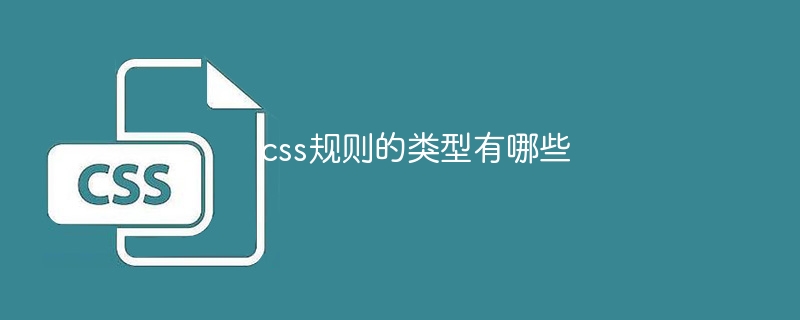What are the types of css rules?
CSS rules include: General rules: Select all elements Type selector: Select elements based on element type Class selector: Select elements based on the class attribute of the element ID Selector: Select elements based on the id attribute of the element (unique) Descendant selector: selects elements within a specific parent element Child selector: selects elements that are direct children of a specific parent element Pseudo-class: selects elements based on their state or attributes Pseudo-element: creates additional content within an element @import rules: Import external stylesheet @media Rules: Apply styles based on media type @keyframes Rules: Define animation keyframe sequences

Types of CSS rules
CSS rules are used to define the styles of web page elements. Depending on scope and specificity, there are the following types of CSS rules:
General rules
- Select all elements.
- For example:
body { ... }
Type selector
- According to the element type Select element.
- For example:
p { ... }
Class selector
- According to the element's The class attribute selects elements.
- For example:
.example { ... }
ID selector
- According to the element The id attribute selects the element (unique).
- For example:
#example { ... }
Descendant selector
- Select specific Element within the parent element.
- For example:
p a { ... }
Sub selector
- Select as specific The element that is a direct child of the parent element.
- For example:
p > a { ... }
Pseudo class
- Based on The element's state or property selects the element.
- For example:
a:hover { ... }Select the effect of the mouse hovering over the element
Pseudo element
- Create additional content within the element.
- For example:
::before { ... }Create text or content before the element
In addition, there are the following special types of rules:
@import rule
- is used to import external style sheets.
- For example:
@import "style.css";
@media rules
- Based on The media type (such as screen size or device type) applies the style.
- For example:
@media screen and (max-width: 768px) { ... }
@keyframes Rules
- Define animation keyframe sequence.
- For example:
@keyframes myAnimation { ... }
The above is the detailed content of What are the types of css rules?. For more information, please follow other related articles on the PHP Chinese website!

Hot AI Tools

Undresser.AI Undress
AI-powered app for creating realistic nude photos

AI Clothes Remover
Online AI tool for removing clothes from photos.

Undress AI Tool
Undress images for free

Clothoff.io
AI clothes remover

Video Face Swap
Swap faces in any video effortlessly with our completely free AI face swap tool!

Hot Article

Hot Tools

Notepad++7.3.1
Easy-to-use and free code editor

SublimeText3 Chinese version
Chinese version, very easy to use

Zend Studio 13.0.1
Powerful PHP integrated development environment

Dreamweaver CS6
Visual web development tools

SublimeText3 Mac version
God-level code editing software (SublimeText3)

Hot Topics
 1386
1386
 52
52
 How to use bootstrap in vue
Apr 07, 2025 pm 11:33 PM
How to use bootstrap in vue
Apr 07, 2025 pm 11:33 PM
Using Bootstrap in Vue.js is divided into five steps: Install Bootstrap. Import Bootstrap in main.js. Use the Bootstrap component directly in the template. Optional: Custom style. Optional: Use plug-ins.
 The Roles of HTML, CSS, and JavaScript: Core Responsibilities
Apr 08, 2025 pm 07:05 PM
The Roles of HTML, CSS, and JavaScript: Core Responsibilities
Apr 08, 2025 pm 07:05 PM
HTML defines the web structure, CSS is responsible for style and layout, and JavaScript gives dynamic interaction. The three perform their duties in web development and jointly build a colorful website.
 How to write split lines on bootstrap
Apr 07, 2025 pm 03:12 PM
How to write split lines on bootstrap
Apr 07, 2025 pm 03:12 PM
There are two ways to create a Bootstrap split line: using the tag, which creates a horizontal split line. Use the CSS border property to create custom style split lines.
 Understanding HTML, CSS, and JavaScript: A Beginner's Guide
Apr 12, 2025 am 12:02 AM
Understanding HTML, CSS, and JavaScript: A Beginner's Guide
Apr 12, 2025 am 12:02 AM
WebdevelopmentreliesonHTML,CSS,andJavaScript:1)HTMLstructurescontent,2)CSSstylesit,and3)JavaScriptaddsinteractivity,formingthebasisofmodernwebexperiences.
 How to set up the framework for bootstrap
Apr 07, 2025 pm 03:27 PM
How to set up the framework for bootstrap
Apr 07, 2025 pm 03:27 PM
To set up the Bootstrap framework, you need to follow these steps: 1. Reference the Bootstrap file via CDN; 2. Download and host the file on your own server; 3. Include the Bootstrap file in HTML; 4. Compile Sass/Less as needed; 5. Import a custom file (optional). Once setup is complete, you can use Bootstrap's grid systems, components, and styles to create responsive websites and applications.
 How to resize bootstrap
Apr 07, 2025 pm 03:18 PM
How to resize bootstrap
Apr 07, 2025 pm 03:18 PM
To adjust the size of elements in Bootstrap, you can use the dimension class, which includes: adjusting width: .col-, .w-, .mw-adjust height: .h-, .min-h-, .max-h-
 How to insert pictures on bootstrap
Apr 07, 2025 pm 03:30 PM
How to insert pictures on bootstrap
Apr 07, 2025 pm 03:30 PM
There are several ways to insert images in Bootstrap: insert images directly, using the HTML img tag. With the Bootstrap image component, you can provide responsive images and more styles. Set the image size, use the img-fluid class to make the image adaptable. Set the border, using the img-bordered class. Set the rounded corners and use the img-rounded class. Set the shadow, use the shadow class. Resize and position the image, using CSS style. Using the background image, use the background-image CSS property.
 How to use bootstrap button
Apr 07, 2025 pm 03:09 PM
How to use bootstrap button
Apr 07, 2025 pm 03:09 PM
How to use the Bootstrap button? Introduce Bootstrap CSS to create button elements and add Bootstrap button class to add button text




